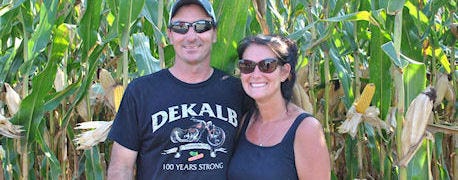
Kevin Kalb, Dubois, doesn't like to grow soybeans. He grew some last year on river bottom land that flooded early and is back to all corn this year.
A farmer that grows continuous corn is not who you would suspect would post a top yield in the National Corn Grower's contest. Both Purdue University agronomists and other seed companies have shown a yield penalty for continuous corn in trials. Yet Kalb won his division of the National Corn Grower's contest in 2013 growing DeKalb Hybrids following several years of continuous corn.
"We've not seen the yield penalty," he says. "We continue to have good luck following corn with corn."

Corn is king here: Kevin Kalb and his wife, Shawn, prefer to raise corn after corn.
To end the story there wouldn't be fair. Kalb believes he has an advantage over many other famers who raise continuous corn. He farms in Jasper County, filled with livestock producers, from hogs to chickens to turkeys and cattle. He applies manure almost every year. The field that produced the top yield last year has a long history of manure application.
Related: Study Finds N Availability, Stover Affect Continuous Corn Yield Penalty
"I really think that may be the difference," Kalb says. "We apply some manure in the fall to help stalks start decomposing and then work it in with a Case IH disc ripper. It works well for us."
Knowing that an organic substance like manure can tie up N early in the season, Kalb applies some N as starter. Actually it's pop-up fertilizer because he applies it in the row. If you're trying this way of applying nitrogen, remember that there are limits on how much N you can apply in the row without damaging seeds or seedlings.
"We also add an insecticide, Capture, into that mix at planting," Kalb continues. "One insect we've seen increase is wireworm. We figure it's because of all the manure that's been applied. We need an insecticide to guard against wireworm damage. "
About the Author(s)
You May Also Like




